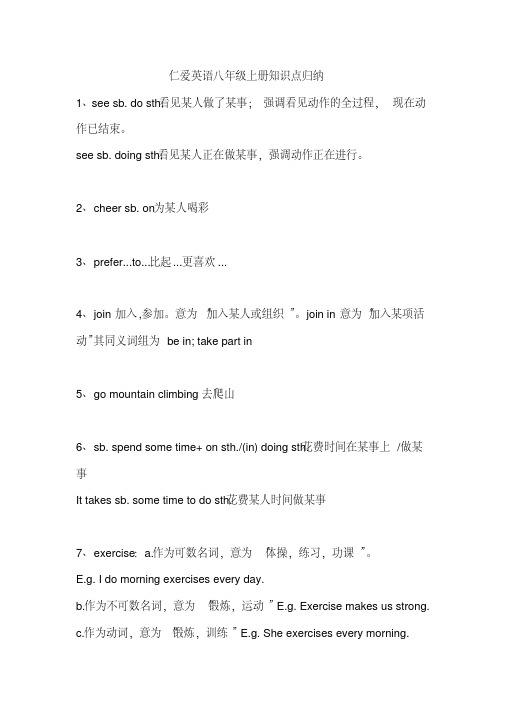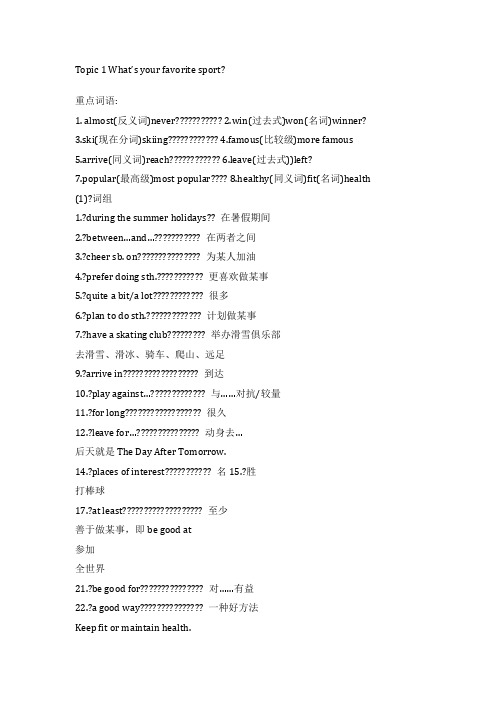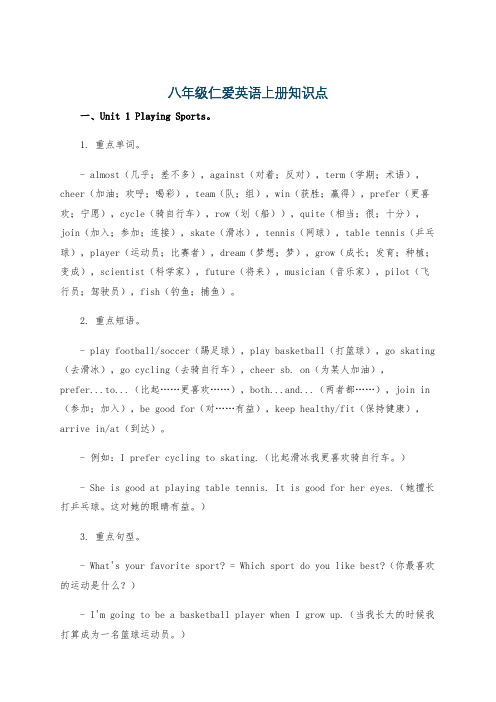仁爱英语八年级上册期末复习知识点归纳及练习
仁爱版英语八年级上册知识点归纳

仁爱版英语八年级上册知识点归纳一、Unit 11.重点词汇:festival, custom, occasion, traditional, celebrate, annual, superstition2.语法:一般现在时和现在进行时3.重点句型:How do you celebrate the Spring Festival? I usually clean the house and have a big family dinner.二、Unit 21.重点词汇:adventure, explore, wander, journey, destination, route, scenery2.语法:一般过去时和过去进行时3.重点句型:We visited the Great Wall and took many photos.三、Unit 31.重点词汇:charity, donation, organization, fund, poverty, volunteer, campaign2.语法:情态动词can, could, may, might表请求、允许、建议、批准等3.重点句型:Can I join the charity bike ride? Sure, you can.四、Unit 41.重点词汇:weather forecast, hurricane, tornado, thunderstorm, lightning, disaster, rescue2.语法:虚拟语气3.重点句型:If I were you, I would take an umbrella because it may rain this afternoon.五、Unit 51.重点词汇:talent show, contestant, judge, round, applause, champion, performance2.语法:感叹句3.重点句型:What a wonderful performance!六、Unit 61.重点词汇:hobby, furniture, instrument, recipe, exhibition, display, masterpiece2.语法:动词不定式3.重点句型:She likes to play the piano in her free time.七、Unit 71.重点词汇:environment, pollution, recycle, global warming, carbon dioxide, emissions, alternative2.语法:虚拟语气3.重点句型:If we don't take action now, the environment will bein great danger.八、Unit 81.重点词汇:vacation, destination, souvenir, guidebook, sightseeing, journey, amodation2.语法:宾语从句3.重点句型:I want to know where you are going for vacation.以上是仁爱版英语八年级上册的知识点归纳。
仁爱版八年级上册英语期末复习知识点整理

仁爱版八年级上册英语期末复习知识点整理Ren'ai n Grade 8 English Midterm Review PointsUnit 1 Task 11.Be going to do sth。
(followed by a verb in the base form。
indicating a planned or arranged n。
meaning "prepare。
plan"。
and also indicating a XXX will happen)Negative sentence: be not going to do sth.n: Is sb。
going to do sth。
Special n: n word + be + sb。
going to do sth。
2.See sb。
do sth。
- see someone do something。
emphasizing the whole process of XXXSee sb。
doing sth。
- see someone doing something。
emphasizing the n in progress。
Similar words include watch。
hear。
etc.3.Cheer sb。
on - cheer for someone。
cheer (the object) on (put the object in the middle)XXX up - (make) someone feel better/happier (put the object in the middle)4.5.Practice sth。
- practice somethingPractice doing sth。
- practice doing somethingPrefer (past tense preferred。
仁爱版英语八年级上册知识点归纳总结

仁爱英语八年级上册知识点归纳1、see sb. do sth.看见某人做了某事;强调看见动作的全过程,现在动作已结束。
see sb. doing sth.看见某人正在做某事,强调动作正在进行。
2、cheer sb. on 为某人喝彩3、prefer...to...比起...更喜欢...4、join 加入,参加。
意为“加入某人或组织”。
join in意为“加入某项活动”其同义词组为be in; take part in5、go mountain climbing去爬山6、sb. spend some time+ on sth./(in) doing sth.花费时间在某事上/做某事It takes sb. some time to do sth.花费某人时间做某事7、exercise:a.作为可数名词,意为“体操,练习,功课”。
E.g. I do morning exercises every day.b.作为不可数名词,意为“锻炼,运动” E.g. Exercise makes us strong.c.作为动词,意为“锻炼,训练” E.g. She exercises every morning.8、be good at; do well in 擅长...;在...做的好be not good at; be weak in; do badly in 在...方面薄弱9、 the high jump跳高;the long jump 跳远10、all over the world; throughout the world; around the world; the whole world 全世界11、be good for对...有益/有好处;反义词短语be bad for12、keep fit/healthy 保持健康13、one of+ the+最高级+可数名词的复数,表示“最...的之一”14、fall ill生病15、be glad to...乐意做...16、do one’s best=try one’s best意为“尽力,努力”17、be angry with sb.生某人的气18、keep doing sth.继续做某事在某人的帮助下19、with the help of sb.=with one’s help以便,为了”so...that...如此...以至于...20、so that “21、more and more 越来越22、sports meet 运动会23、stand for 代表24、in the future 在将来25、What’s wrong with you?其同义句为What’s the matter/trouble with you?你怎么啦?26、I’m sorry +动词不定式,“为...感到抱歉/难过”27、have a cold感冒;have a cough咳嗽;have a headache头痛;havea stomachache胃痛,肚子痛28、at night在夜里;in the evening在傍晚29、have a rest=take a rest休息30、feel like doing sth.=would like to do sth.想做某事31、too much修饰不可数名词,还可用来修饰动词too many修饰可数名词的复数形式很,太”,用来修饰形容词或副词much too “32、lie down 躺下33、something new 新的事something, anything, nothing等不定代词,被形容词修饰时,形容词谓语其后作后置定语34、three times a day一天三次35、have an accident发生一场事故36、take care of+名词/代词,意为“照顾,照看,保管”37、return to sp.返回某地。
仁爱版英语八年级上册语法知识点期末复习练习题(1)

1.—Would you mind ___here? —I’m sorry about that. I’ll go somewhere else. A. no smoking B. not smoking C. no smoke D. not smoke
2. —Would you mind if ___my bike here? A. I put B. I putting C. me put D. my putting
做…事(对某人来说)是…的
1.You are too weak.
_____ important for you _______ every day. A. They’re; to exercise B. It’s; to exercise C. They’re; exercising D. It’s; exercising
• 我不介意(3) • 没关系(3)
• —I’m so sorry for losing your dictionary. —_______ A. Oh, it doesn’t matter. B. You’re welcome. C. That’s OK. D. Thank you all the same.
3.—Would you please _______ so much noise? —Oh, sorry, I won’t. A. not make B. don’t make C. not to make D. making
Join , join in,take part in
1.—Would you mind ___ us in the game?
1. Don’t shout at him. He is only _______ boy. A. a eight-year-old B. an eight-year-old C. a eight years old D. an eight years old
(完整版)仁爱版英语八年级上知识点归纳

Topic 1 What’s your favorite sport?重点词语:1. almost(反义词)never2.win(过去式)won(名词)winner?3.ski(现在分词)skiing4.famous(比较级)more famous5.arrive(同义词)reach6.leave(过去式))left?7.popular(最高级)most popular 8.healthy(同义词)fit(名词)health (1)?词组1.?during the summer holidays?? 在暑假期间2.?between…and… 在两者之间3.?cheer sb. on 为某人加油4.?prefer doing sth. 更喜欢做某事5.?quite a bit/a lot 很多6.?plan to do sth. 计划做某事7.?have a skating club 举办滑雪俱乐部去滑雪、滑冰、骑车、爬山、远足9.?arrive in 到达10.?play against… 与……对抗/较量11.?for long 很久12.?leave for… 动身去…后天就是The Day After Tomorrow.14.?places of interest 名15.?胜打棒球17.?at least 至少善于做某事,即be good at参加全世界21.?be good for 对……有益22.?a good way 一种好方法Keep fit or maintain health.24.?relax oneself 放松某人自己重点句型你最喜爱的运动是什么?26.?Which sport do you prefer? = Which sport do you like better? 你更喜欢什么运动?I prefer skating. = I like skating better. 我更喜欢滑雪.你常滑雪吗?或Do you often skate?28.?She spends at least half an hour in the gym every day. 每天她至少花半小时在体育馆.29.?She plays baseball pretty well and she is also good at jumping.她棒球打得相当好而且擅长于跳.30.?What kind of sports do you like? = Which sport do you like? 你喜欢哪种运动? 重点语言点31.?see sb. do sth? “看见某人做了某事” 强调动作的全过程,常与every day; often 等连用.see sb. doing sth.? “看见某人正在做某事” 强调动作正在进行.I saw you play basketball almost every day during summer holidays.I often see him draw pictures near the river. 我常看见她在河边画画.I saw her go across the street.? 我看见她过了马路我看见她正在过马路。
仁爱版八年级上册英语期末复习知识点整理

仁爱版八年级上册英语期末复习知识点整理U1T11、Be going to do sth.(后面加动词原形,表示按计划或安排要发生的动作,意为“准备;打算”,也表示推测将要或肯定会发生的动作)否定句:be not going to do sth.疑问句:be sb. going to do sth.?特殊疑问句:疑问词+be+sb. going to do sth.?2、see sb. do sth.看见某人做某事,强调看见事情的全过程或事情的经常性、重复性发生see sb. doing sth. 看见某人正在做某事,强调动作正在进行。
类似单词watch,hear等3、cheer sb. on为……加油,向……欢呼(宾语放在中间)cheer sb. up(使)……振作/高兴起来(宾语放在中间)4、practice sth.练习某事practice doing sth.练习做某事5、prefer(过去式preferred,现在分词preferring)=like better用法:(1)prefer sth.更喜欢某物(2)prefer A to B 相对于B更喜欢A(3)prefer doing sth. 更喜欢做某事(4)prefer doing A to doing B相对于做B事喜欢做A事6、join & join inJoin:后加团队,组织,俱乐部Join in=take part in=be in:后加活动7、wish & hopewish(1)wish+从句(2)wish to do sth.希望做某事(3)wish sb. to do sth.希望某人做某事hope(1)hope +that从句(2)hope to do sth.希望做某事8、a bit=a little有一点,修饰形容词a bit of+不可数名词=a little+不可数名词quite a bit/a little=quite a lot相当多地9、句式:主语+be+数词+量词+形容词Eg.He is 2.26 meters tall.10、(1)play for为……效力(2)play against与……比赛(3) play with 玩某物/与某人玩11、dream of/about(doing)sth.梦见……12、grow(过去式grew)(1)做“生长”讲,不及物动词Eg:The flowers grow very well.(2)做“种植”讲,及物动词Eg:I grow some flowers in my garden.13、spend & cost & takeSpend(人做主语)花费时间和金钱Sb. spend…in some place某人在某地度过多长时间Sb. spend…(in) doing sth.某人花费时间或金钱做某事Sb. spend…on sth.某人在某事上花费金钱或时间Cost(物做主语)花费金钱Sth. cost sb. some money某物花费某人多少钱Take(it做主语)花费时间It takes sb. some time to do sth.做某事花费某人多长时间14、be good/bad for…对……有益处/害处15、exercise n.锻炼,做操,练习,习题v.锻炼do exercise 做运动、做锻炼do eye exercises 做眼保健操(分节时exercise加-s)do morning exercises 做早操16、be good at 擅长于…的be good at sth.=do well in sth.擅长某事be good at doing sth.=do well in doing sth.擅长做某事17、keep healthy= keep fit 保持健康18、make & keepMake(1)make+宾语+adj.“使…保持…”Eg: You make me happy.(2)make+宾语+n.Eg: We made him monitor.(3)make+宾语+do sth.=ask+宾语+to do sth.Eg: My mom makes me clean the room.=My mom asks me to clean the room.(4)make+宾语doing sth,使某人一直做某事Keep(1)keep+adj.Eg:Keep quiet.(2)keep+宾语+adj“使…保持….”Eg:These gloves will keep your hands warm.(3)keep doing sth. 一直做某事(4)keep sb. from doing sth.阻止某人做某事(5)keep a pet 养一个宠物19、be popular with sb.对某人来说很受欢迎(受到某人的喜爱)20、arrive in+大地点(城市、国家……)到达……arrive at+小地点(乡村、车站……Attention:飞机场是小地点)到达……Attention:arrive,get 后可直接加地点副词21、leave 离开(过去式为left)leave (A) for B (从A处)动身前往B地Attention:leave是趋向动词,常用现在进行时表将来,类似动词还有:come,go,arrive,stay等Leave还可以当“把……留下”22、excited人感到兴奋的exciting (物)令人感到兴奋的类似的词还有:interested---interesting relaxed---relaxingbored---boring surprised---surprisingshocked---shocking tired---tiring等等23、a number of+可数名词复数=many+可数名词复数“大量的,许多的”谓语动词用复数The number of+可数名词复数,“…的数量”,谓语动词用单数Number用large,small修饰& Price用high和low修饰,U1T21、One of+可数名词复数,表示“……其中之一”,其谓语动词用单数2、fall ill生病,得病(fall为系动词,后面加形容词)be ill & fall illfall ill强调动作,短暂性动词词组,不能和“for+时间段”连用be ill强调状态,是持续性行为,可以和“for+时间段”连用3、be glad to do sth.乐意做某事4、句式:Would you mind (not)+v.-ing+其它?回答:I am sorry… /I’d afraid you’d better not.(委婉拒绝)Certainly not./Of course not./No, not at all./Never mind.(赞同和接受对方建议) 其它用法:(1)Would you mind+形容词性物主代词/宾格+doing sth.Eg: Would you mind my/me smoking here?(2)Would you mind +if 从句?Eg:Would you mind if I smoke ?=Would you mind my smoking?5、双宾语结构:kick sth. to sb.=kick sb. sth.把某物体给某人pass sth. to sb.=pass sb. sth.把某物传给某人6、shout to sb.冲某人高声喊shout at sb.冲某人(生气地)叫喊,有骂的含义7、have a fight(n.) with sb.=fight(v.) with sb.与某人争论或打架Attention:fight for sth.为……而奋斗fight against…与……作斗争(争吵)8、do one’s best=try one’s best尽某人最大努力do one’s best to do sth.尽某人最大努力去做某事9、be angry with sb.因某人而生气be angry with sb. for sth. 因某人做了某事而生气be angry at/about sth.因某事而生气10、be sorry for/about (doing) sth.因(做了)某事而感到抱歉11、have fun (in ) doing sth.在做某事中获得了极大乐趣12、be sure that +从句,表示确信……如果sure后面的主语和前面的主语是同一个,就用“be sure to do sth.如果不是同一个主语就用“be sure that……”补充:be sure of/about……对…确信/肯定/有把握,后面可以是名词或代词13、(1)at first起初,一开始First of all首先,尤为重要的是(反义词组at last)(2)so that…(引导目的状语从句)“为了…,以便于…”& so+adj./adv.+that…(引导结果状语从句)“如此…以至于…”拓展:too…to…“太…以至于不能…”not …enough to “不足够…做某事”14、throw…through…“扔…穿过…”15、throw…away扔掉,抛弃throw…around(about)乱扔throw…into把…扔进…throw…out of…把…抛出去16、stop sb. (from) doing sth.=prevent…(from)doing sth.=keep…from doing sth.阻止某人做某事17、for example& such asfor example+句子,前为句号,后有逗号,可放在句首、句中、句末such as+名词或名词性短语,放在被列举的事物与前面的名词之间,前为逗号,后没有逗号18、(1)some of+[C]复数/宾格人称代词复数,谓语动词用复数,意为“…其中一些…(2)some of+[U],谓语动词用单数拓展:many of+可数名词复数,“…中的很多(人或事)”much of+不可数名词“…中的很多”19、turn… into…将…变成…Turn & get & becomeTurn,指性质、品质、状态、颜色放生变化,后面加形容词或名词turn A into B“把A变成B”Get,多用于口语,表示一种变化过程,强调“渐渐变得”,后面加形容词的比较级Become,多指身份、职位等的变化,强调变化的结果,后面加形容词20、用v.-ing表示伴随状语,前后两句中间有逗号21、hit one’s head=hit sb. on the head打某人的头22、be+v.-过去分词,表示被动23、by(prep.)+doing sth. 通过某种方式去做某事24、be angry at/about sth.对于某事很生气U1T31、Sb. do sth. for the first time.=It’s the first time for sb. to do sth.=It’s one’s first time to do sth.这是某人第一次去做某事2、Let’s make(约定) it half past six.Attention:这里的时间前不加at3、a symbol of(名词词组),“…的标志”Stand for(动词词组),“代表,象征”4、each+可数名词单数,“每一个”5、Every:①every+可数名词单数②句式:every+基数词+名词复数Eg: every four years“每四年,每隔三年”every three days“每三天,每隔两天”6、have the chance to do sth.有机会去做某事7、one day 有一天,可用在将来时,也可以是过去时the other day 不久前的一天,用于一般过去时8、be able to do sth.(可用于各种时态)=can do sth.(只有一般现在时和一般过去时)“能够做某事”9、with the help of sb. =with one’s help 在某人的帮助下10、be going to & will & shall(一般将来时)a)be going to+动词原形①表示打算、近期要做的事情②有迹象表明即将发生的事b)will+动词原形①表示带意愿色彩的将来或客气的邀请或命令时②表示说话人认为某事会发生③客观事情的发生与主观愿望或判断无关c)shall+动词原形,主语为第一人称①表示未来的事实或对将来的预测②表示带意愿色彩的将来或客气的邀请或命令时d)be+v.-ing表示将来(位移动词):start/leave/fly/move/go/stay/come/arrive等11、for the first time“首次,第一次”在句子中做时间状语12、make friends交朋友make friends with sb. 与……交朋友U2T11、well:①adj.表示身体好的,健康的②adv.好地2、What’s wrong with sb.?=What happened to sb.?某人怎么了?3、have a headache/toothache/backache/stomachache/fever头疼/牙疼/背疼/胃疼/发烧have the flu 患流感严重的病可用terrible或bad来修饰4、I’m sorry+动词不定式,或I’m sorry +that 从句表示对所做错事的一种歉意或听到不好消息时的委婉表达5、should,情态动词,常用来建议或告诫别人该做什么不该做什么,后面加动词原形(否定形式:shouldn’t)6、had better do sth.最好做某事had better not do sth.最好不要做某事7、现在完成时句子基本构成:have/has+动词的过去分词(have和has是助动词,无意义)8、take sb. to sp.带某人去某地9、have a rest=take a rest休息一下10、suggest=advise建议(v.)suggest sb.(not) to do sth.advise sb. (not) to do sth. 建议某人(不要)去做某事suggestion(可数)=advice(不可数)建议(n.)一条建议a piece of advice两条建议two pieces of advice11、take pills(pill,可数,专指药丸)take medicine(medicine,不可数,泛指药)Attention:吃药不能用have和eat12、feel like(介词) doing sth.=want to do sth.=would like to do sth. 想要做某事13、nothing,something,anything等不定代词碑形容词修饰时,形容词放其后14、while & when(引导时间状语从句)当……时候While:①动词必须是延续性动词②从句和主句的动作同时发生,两句都用过去进行时③强调主句的动作在从句的动作发生过程中When:①动词可以是短暂性动词,也可以是延续性动词②主句用过去进行时,从句一般用一般过去时③从句和主句的动作可以同时发生,也可以先后发生15、need:①sb. need sth.“某人需要某物”②sb. need to do sth.“某人需要做某事”③sth. need doing sth.=sth. need to be+过去分词“某物需要被…”Attention:在否定句种和疑问句中need为情态动词16、run to sb.向某人跑去run into sb.撞到某人17、hurt:vt.使伤心,伤害(强调动作)vi.受伤,受疼痛(强调状态)adj.受伤的,痛的18、check over=look over仔细检查(代词放中间Eg:check me over)19、help sb. (to) do sth.帮助某人做某事help sb. with sth.20、ask:请两天的假:ask for two days’ leave =ask for two-day leaveask for help请求,恳求ask sb. for help向某人求救(call sb. for help向某人打电话求救)21、return to=go back to返回…(当地点为地点副词时,去掉to)22、too much+不可数名词“太多…”much too+形容词“太…”too many+可数名词复数too much 放在动词后,表示“做某事太多次”23、thanks/thank you for sth./doing sth.因为(做)某事而感谢某人24、接受建议:follow(take)the advice25、worry & worriedSb. worry about sth.(强调担心的动作)Sb. be worried about sth.(强调担心的状态)26、for+时间段,回答由“How long”引导的问句27、take:take medicine(pills)吃药take the temperature 量体温take…to…带某人或某物去某地take away 带走take off 脱下,起飞take…with…随身携带某物U2T21、动名词做主语,谓语动词用单数2、Because(conj.):后面加句子Cause(v.):后面加宾语3、without(prep.)后面加名词、代词、动名词4、must:①情态动词,后面加动词原形②在肯定句中,表示肯定推测,可能性最大③引导一般疑问句,答语:Yes,主语+must.No,主语+needn’t或don’t have to.拓展:表示推测:肯定:must>can>could>may>mightMust语气最强烈,“一定”can理论上可能,但未必会发生,“可能”could再次“can”,“可能”may/might无把握的推测,“也许,可能”(might比may更没有把握)否定:can’t>couldn’t>may not>might notcan’t,语气最强烈,“一定不“couldn’t,比can’t语气弱,表示某事不一定真实,“可能不”may not和might not(无把握的)否定推测,“或许不”用于疑问句的推测,一般只用can和could5、say表示电话、报纸、广播、布告、电视上说,不一定能真正意义上说出声,但表达传递出了一定的内容6、even adv.通常置于所修饰词之前,若有助动词放助动词后,还可修饰比较级(还有alot,much,a little)7、ask sb.(not) to do sth.要求某人(不要)做某事tell sb.(not) to do sth.告诉某人(不要)做某事8、give up:①后加宾语(名词、代词、动名词)②加代词作宾语,宾语放中间(give it up)9、enough:①adj. “充分的,足够的”,加名词②adv.“充分地,足够地”,修饰形容词和副词,放其后③n. “足够”10、主过从过:主句用过去时,宾语从句也用过去时Eg: She said it might cause illness.主将从现:主句用将来时,状语从句用一般现在时表将来Eg: If it doesn’t rain tomorrow, I will play soccer.as soon as “…就马上…”引导时间状语从句,此句型“主将从现”Eg: I will call you as soon as I get to Beijing.11、照顾好某人:①care for sb. very well.②look after sb. very well.③take good care of sb.12、强迫某人(不要)做某事Force sb. (not) to do sth.13、感官动词:taste sound feel look smell尝起来,听起来,感觉起来,看起来,闻起来(感官动词后面加形容词)14、Could & maycould:①can的过去式②在疑问句中表示委婉请求may:①表推测,可能,用于肯定句中②表请求、许可,意为“可以”,可和“can”互换(表请求时用于第一人称的一般疑问句时,否定回答用mustn’t或can’t)③表祝愿15、do harm to sb.对某人有害16、not only…but(also)…不仅…而且…,并列两个对等的句子成分。
八年级仁爱英语上册知识点

八年级仁爱英语上册知识点一、Unit 1 Playing Sports。
1. 重点单词。
- almost(几乎;差不多),against(对着;反对),term(学期;术语),cheer(加油;欢呼;喝彩),team(队;组),win(获胜;赢得),prefer(更喜欢;宁愿),cycle(骑自行车),row(划(船)),quite(相当;很;十分),join(加入;参加;连接),skate(滑冰),tennis(网球),table tennis(乒乓球),player(运动员;比赛者),dream(梦想;梦),grow(成长;发育;种植;变成),scientist(科学家),future(将来),musician(音乐家),pilot(飞行员;驾驶员),fish(钓鱼;捕鱼)。
2. 重点短语。
- play football/soccer(踢足球),play basketball(打篮球),go skating (去滑冰),go cycling(去骑自行车),cheer sb. on(为某人加油),prefer...to...(比起……更喜欢……),both...and...(两者都……),join in (参加;加入),be good for(对……有益),keep healthy/fit(保持健康),arrive in/at(到达)。
- 例如:I prefer cycling to skating.(比起滑冰我更喜欢骑自行车。
)- She is good at playing table tennis. It is good for her eyes.(她擅长打乒乓球。
这对她的眼睛有益。
)3. 重点句型。
- What's your favorite sport? = Which sport do you like best?(你最喜欢的运动是什么?)- I'm going to be a basketball player when I grow up.(当我长大的时候我打算成为一名篮球运动员。
仁爱英语八年级上册期末复习知识点归纳及练习

仁爱英语2019-2020学年八年级上册期末知识归纳Unit1 Playing SportsTopic1 I’m going to play basketball.1. 常见的感官动词有:see, watch, hear, notice, smell等。
后可接①动词ing形式,表此动作正在发生。
如:“看见某人正在做某事” see sb. doing sth②动词原形,不表此动作正在发生, 表此动作已完成或存在的事实。
如:看见某人做了某事”see sb.do sth.2. hope后可加①hope to do sth.②hope + that从句3. win 过去式为won, winner胜利者.4. Would you like + to do? 表建议或邀请。
常用I’d love to 或I’d be glad to来回答,不同意也常用“I’d love to, but… ” 来拒绝别人。
5. cheer sb on (以欢呼)激励某人,为某人加油,向某人欢呼后接名词,放在cheer on的中间和后面都可以;人称代词,则必须放在中间。
关掉灯turn off the light/turn the light off关掉它turn it off6. prefer 意为“更喜欢”,其后可接名词、动名词或动词不定式。
如:(1)prefer A to B 相比A更喜欢B(2)prefer doing A to doing B 相比做A更喜欢做B(3)prefer to do A rather than do B宁愿做A而不愿做B7. 与how构成的疑问词有:How tall(身高)多高; how high(山)多高;how heavy多重;how long 多长;How wide 多宽;how deep 多深;how old 多大…. (how + adj.)How often 多经常how long 多久8. play for 为某个队效力;play against 与某个队比赛;play with 玩某物/与某人玩9. once a week, 一周一次twice a week一周两次three times a week 一周三次four times a week 一周四次三次或三次以上用“数字+times”扩展:对once a week提问,要用how often提问10. exercise “体操、练习”,可数名词。
- 1、下载文档前请自行甄别文档内容的完整性,平台不提供额外的编辑、内容补充、找答案等附加服务。
- 2、"仅部分预览"的文档,不可在线预览部分如存在完整性等问题,可反馈申请退款(可完整预览的文档不适用该条件!)。
- 3、如文档侵犯您的权益,请联系客服反馈,我们会尽快为您处理(人工客服工作时间:9:00-18:30)。
仁爱英语2019-2020学年八年级上册期末知识归纳Unit1 Playing SportsTopic1 I’m going to play basketball.1. 常见的感官动词有:see, watch, hear, notice, smell等。
后可接①动词ing形式,表此动作正在发生。
如:“看见某人正在做某事” see sb. doing sth②动词原形,不表此动作正在发生, 表此动作已完成或存在的事实。
如:看见某人做了某事”see sb.do sth.2. hope后可加①hope to do sth.②hope + that从句3. win 过去式为won, winner胜利者.4. Would you like + to do? 表建议或邀请。
常用I’d love to 或I’d be glad to来回答,不同意也常用“I’d love to, but… ” 来拒绝别人。
5. cheer sb on (以欢呼)激励某人,为某人加油,向某人欢呼后接名词,放在cheer on的中间和后面都可以;人称代词,则必须放在中间。
关掉灯turn off the light/turn the light off关掉它turn it off6. prefer 意为“更喜欢”,其后可接名词、动名词或动词不定式。
如:(1)prefer A to B 相比A更喜欢B(2)prefer doing A to doing B 相比做A更喜欢做B(3)prefer to do A rather than do B宁愿做A而不愿做B7. 与how构成的疑问词有:How tall(身高)多高; how high(山)多高;how heavy多重;how long 多长;How wide 多宽;how deep 多深;how old 多大…. (how + adj.)How often 多经常how long 多久8. play for 为某个队效力;play against 与某个队比赛;play with 玩某物/与某人玩9. once a week, 一周一次twice a week一周两次three times a week 一周三次four times a week 一周四次三次或三次以上用“数字+times”扩展:对once a week提问,要用how often提问10. exercise “体操、练习”,可数名词。
如:do morning exercises; do English exercises“锻炼,运动”,不可数名词。
如:do exercise“锻炼,运动”,动词。
如:She exercises every morning.11. be good at…= do well in…擅长于… 如:I am good at English.= I do well in English.be good for… 对…有好处,Running is good for your health.反义词为:be bad at= do badly in 不擅长…. be bad fo r 对… 有害12. make/keep sb./sth. + adj 使某人/某物怎么样make sb./sth. + do sth. 使某人/某物做某事13. leave + 地点“离开某地”leave for + 地点“动身前往某地”leave + 地点+ for +地点“离开某地去某地”14. (1) join 加入+(人群,组织)He joined in the game.(2) take part in = join in = be in 参加+(活动,比赛)I’ll be in the relay race. We’ll join the army.15. grow up 长大成人。
如:when I grow up, I want to work in Shenzhen.(2) grow过去式为grew,做“生长”讲时为不及物动词,做“种植”讲时为及物动词。
16. (1) spend some time/money (in) doing sth. 花费时间/金钱做某事spend还可用于“spend some time/money on sth.”在某事上花费时间/金钱。
如:I spend an hour in practicing English every day.•扩展:take, cost和pay也可指花费,但用法不同。
①take的主语一般it固定句型It takes sb. some time to do sth. 表示“做某事花费某人多少时间”。
如:It takes me an hour to do my homework every day.②cost的主语必须是“物”。
固定句型sth. cost(s) sb. some money 结构中。
如:如:The book cost me 30 yuan last week.③pay的主语是人,固定句型pay... for。
如; He paid 5 yuan for this pen.17. 表到达的有:①arrive at + (小地名);arrive in +(大地名)②get to + 宾语③reach + 宾语。
Topic 2 We should learn teamwork.1. one of + 可数名词复数+ 谓单,译为“......之一”2.Would you mind (not) doing sth. 你介意(别)做某事吗?(礼貌地请求某人做或别做某事)Would you mind my smoking here? (I)(常用物主代词my, her, his, our 等)PS:(不介意) 肯定回答:Not at all . / Of course not. / Certainly not.( 介意) 否定回答:Sorry, I won’t. /Yes, please don’t. / You’d better not.3. keep的用法: ①keep (sb) doing sth. 让某人一直做某事②keep + adj保持怎么样4. something, anything, nothing等都是不定代词,当形容词修饰不定代词、不定副词或特殊疑问词的时候,修饰词要放在这些被修饰词的后面。
something important重要的事情;Anything else? 还有别的吗?Nothing serious 不严重5. be sorry for 表为……道歉,后面接名词、代词、从句或动名词。
be sorry to do sth. 抱歉去做某事。
6. be sure的用法①be sure to do sth.. 确信要做某事(表将来)It’s sure to rain. 肯定要下雨。
②be sure +(that)从句, We are sure that we will win next time.have fun (in) doing sth做某事有乐趣7. It is + 形容词+(for sb.) + to do sth. 意为“(对某人而言)做……是……样的”8. a large number of 大量的许多, 后接谓语动词复数形式the number of ... 的数量,后接谓语动词单数形式9. lost为lose的过去式lose失去;lose one’s life丧命lose输掉lose in the game输掉比赛lose迷失;lose one’s way迷路;lose oneself in...迷失于……10. finish (doing) sth.完成(做)某事11. (1) through 介词,意为“通过,穿过”,指从物体的中间通过、穿过across介词,意为“通过,穿过”,指从物体的表面通过、穿过Topic3 The school sports meet is coming.1. 合成形容词:(1)'s八百米竞赛800 meters'race 三分钟的路程three minutes'walk(2)连字符“-”男子八百米竞赛800-meter race 三分钟的路程three-minute walk2. be in + 活动,表“参加某活动,相当于take part in 和join in3. exciting adj. 意为“令人激动的,令人兴奋的”,与其搭配的常是某物。
excited adj. 意为“感到激动的,感到兴奋的”,与其搭配的主语通常是人。
(类似的词还有interesting 和interested, tired 和tiring等)4. It’s one’s first time to do sth. 是某人第一次做… 如:It’s her first time to cook dinner.5. have lots of fun.①此处fun 为不可数名词,译为“乐趣”形容词为funny玩得很愉快have a good timeenjoy oneself②have fun doing sth. 做某事有趣6. 约定在...几点make it + 时刻(注意没有at)make 定,约定。
7. can/be able to区别can 用在现在时和过去时be able to 用于各种时态can和be able to不能连用Unit2 topic 11. well 的用法(1)look well.look在这里译作“看起来”,作连系动词,后接形容词。
(2)sleep well .well 通常来说是副词,但是当表示身体好坏时,是形容词。
2. What’s wrong with you?=What’s the matter/trouble with you?3. suggest/advisesuggest doingadvise to dosuggestion 可数名词advice不可数名词advise动词4. enough修饰名词enough+名词修饰形容词/副词形容词/副词+enough+名词“形前名后”5. 表建议或劝告had better (not) do sth. 最好(不)做某事should (not) do sth. (不)应该做某事6. medicine/piltake medicine 吃/服药(片) medicine不可数have/take pills 吃/服药(片) pill可数7. too much + 不可数名词,表“太多……”too many+可数名词复数much too + 形容词,表“太……”candy为不可数名词,做糖的种类时就可数了。
